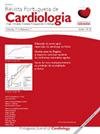Quality of life score association with other patient-reported outcomes: Validating Minnesota Living with Heart Failure Questionnaire to Portuguese
IF 1.6
4区 医学
Q3 CARDIAC & CARDIOVASCULAR SYSTEMS
引用次数: 0
Abstract
Introduction and objectives
Pragmatic validated instruments are needed to assess quality of life (QoL) in the real-world care of heart failure (HF) patients. This study aimed to validate the Minnesota Living with Heart Failure Questionnaire (MLHFQ) in European Portuguese and to search for associations with other patient-reported outcomes (PROs).
Methods
This is a single-center prospective study with two samples of HF patients, used for MLHFQ translation, cultural adaptation and validation. Validation sample included patients managed in a multidisciplinary HF clinic between February 29, 2016, and February 29, 2020.
Results
The validation sample included 294 HF patients, with a median age of 78 years, 53.1% female sex, 45.2% with reduced left ventricle ejection fraction (LVEF) and 43.9% with preserved LVEF. The principal component analysis identified three components, representing three groups of questions from the MLHFQ, each related to one domain and subscore: physical, emotional and social. The validated version showed a reliable general factor and good internal consistency. MLHFQ total score was associated with all the other variables studied. All the scores were strongly associated with NYHA functional class. Associations were found between the physical score and both the Borg fatigue score and the six-minute walking distance. Emotional score was associated with both anxiety and depression scores from Hospital Anxiety and Depression Scale.
Conclusions
This study validated the MLHFQ in Portuguese and revealed the existence of three subscores. It enables the pragmatic assessment of the QoL of Portuguese HF patients, particularly of those with preserved LVEF, and future research concerning PROs.
生活质量评分与其他患者报告结果的关联:验证明尼苏达州心力衰竭患者对葡萄牙人的问卷调查。
简介和目的:需要实用的、经过验证的工具来评估心力衰竭(HF)患者的生活质量(QoL)。本研究旨在验证欧洲葡萄牙语的明尼苏达州心力衰竭患者生活问卷(MLHFQ),并寻找与其他患者报告的结果(PROs)的关联。方法:这是一项单中心前瞻性研究,有两个HF患者样本,用于MLHFQ翻译、文化适应和验证。验证样本包括2016年2月29日至2020年2月29日期间在一家多学科心衰诊所就诊的患者。结果:验证样本包括294例HF患者,中位年龄为78岁,女性53.1%,左心室射血分数(LVEF)降低45.2%,LVEF保存43.9%。主成分分析确定了三个组成部分,代表MLHFQ中的三组问题,每组问题与一个领域和子分数有关:身体,情感和社会。验证版总体因子可靠,内部一致性好。MLHFQ总分与所研究的所有其他变量相关。所有评分均与NYHA功能等级密切相关。身体评分与博格疲劳评分和6分钟步行距离之间存在关联。情绪得分与医院焦虑抑郁量表的焦虑和抑郁得分相关。结论:本研究验证了葡萄牙语的MLHFQ,并揭示了三个分值的存在。它使葡萄牙HF患者,特别是保留LVEF的患者的生活质量的实用评估,以及有关PROs的未来研究成为可能。
本文章由计算机程序翻译,如有差异,请以英文原文为准。
求助全文
约1分钟内获得全文
求助全文
来源期刊

Revista Portuguesa De Cardiologia
CARDIAC & CARDIOVASCULAR SYSTEMS-
CiteScore
2.70
自引率
22.20%
发文量
205
审稿时长
54 days
期刊介绍:
The Portuguese Journal of Cardiology, the official journal of the Portuguese Society of Cardiology, was founded in 1982 with the aim of keeping Portuguese cardiologists informed through the publication of scientific articles on areas such as arrhythmology and electrophysiology, cardiovascular surgery, intensive care, coronary artery disease, cardiovascular imaging, hypertension, heart failure and cardiovascular prevention. The Journal is a monthly publication with high standards of quality in terms of scientific content and production. Since 1999 it has been published in English as well as Portuguese, which has widened its readership abroad. It is distributed to all members of the Portuguese Societies of Cardiology, Internal Medicine, Pneumology and Cardiothoracic Surgery, as well as to leading non-Portuguese cardiologists and to virtually all cardiology societies worldwide. It has been referred in Medline since 1987.
 求助内容:
求助内容: 应助结果提醒方式:
应助结果提醒方式:


